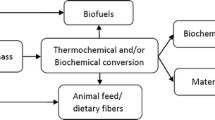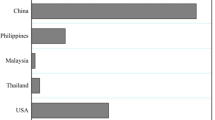Abstract
According to the global survey, Iran, China, India, and USA are leading producers of pomegranate. Among them, India tops the chart as the highest producer of pomegranate, cultivating 1.14 million tons per annum. Peels cover 50% weight of whole pomegranate fruit and are mostly discarded as waste. This enormous peel waste has innumerable health benefits. Pomegranate peel (PP) constitutes various antioxidants, anthocyanins, and polyphenols such as ellagic acid, pectin, gallic acid, and many others which can be extracted. A detailed process for sequential extraction, with zero discharge, of such valuable chemicals from biorefinery point of view is developed in this study. Major products considered for extraction include ellagic acid (EA), lignin, and pectin. Also, the total phenolic content (TPC) and total reducing sugar (TRS) content are found in the intermediate stages. The percent yield of the products EA, lignin, and pectin is 10%, 13%, and 19% with respect to the weight of pomegranate peels (PP) processed. For the first time, a sequential extraction of products with its detailed process flow diagram, process inventory, and life cycle assessment (LCA) of PP biorefinery is presented. The global warming potential of the PP biorefinery is found to be 4505.8 kg CO2 eq. per ton of PP processed. The intense hydrolysis step contributed majorly to the overall GWP indicator.








Similar content being viewed by others
References
Bi Quochem Folin Ciocalteau Phenolic Content Quantification Assay Kit
Chandra R, Tejrao V, Jyotsana J (2010) Global Scenario of Pomegranate ( Punica granatum L .) Culture with Special Reference to India
Guinée JB (2002) Handbook on life cycle assessment operational guide to the ISO standards
Gullon B, Pintado ME, Pérez-Álvarez JA, Viuda-Martos M (2016) Assessment of polyphenolic profile and antibacterial activity of pomegranate peel (Punica granatum) flour obtained from co-product of juice extraction. Food Control 59:94–98
Gusakov AV, Kondratyeva EG, Sinitsyn AP (2011) Comparison of two methods for assaying reducing sugars in the determination of carbohydrase activities. https://doi.org/10.1155/2011/283658
International Organization for Standardization (2006) ISO 14044: Environmental management — Life cycle assessment — Requirements and guidelines
Jadhav VTSJ (2007) Pomegranate cultivation is very promising. Indian Horticulture 52:30–31
Jalal H, Pal MA, Hamdani H, Rovida M (2018) Antioxidant activity of pomegranate peel and seed powder extracts. Journal of Pharmacognosy and Phytochemistry 7: 992–997
Joglekar SN, Kharkar RA, Mandavgane SA (2018a) Process development of silica extraction from RHA : a cradle to gate environmental impact approach
Joglekar SN, Pathak PD, Mandavgane SA, Kulkarni BD (2019) Process of fruit peel waste biorefinery: a case study of citrus waste biorefinery, its environmental impacts and recommendations. Environ Sci Pollut Res 26:1–10. https://doi.org/10.1007/s11356-019-04196-0
Joglekar SN, Tandulje AP, Mandavgane SA, Kulkarni BD (2018b) Environmental impact study of bagasse valorization routes. Waste Biomass Valoriz 10:2067–2078. https://doi.org/10.1007/s12649-018-0198-9
Kiss AA, Geertman R, Wierschem M, et al (2018) Ultrasound-assisted emerging technologies for chemical processes
Labs L Ellagic Acid
Lu J, Yuan Q (2007) A new method for ellagic acid production from pomegranate husk. 31:443–454. https://doi.org/10.1111/j.1745-4530.2007.00169.x
Mahmood Z, Yameen M, Jahangeer M et al (2018) Lignin as natural antioxidant capacity. Lignin Trends Appl. https://doi.org/10.5772/intechopen.73284
Pathak PD, Mandavgane SA, Kulkarni BD (2017) Valorization of pomegranate peels: a biorefinery approach. Waste Biomass Valoriz 8:1127–1137. https://doi.org/10.1007/s12649-016-9668-0
Rami E, Rami S, Patel I (2017) High performance liquid chromatography method for quantification of ellagic acid in in vivo and in vitro plant parts of Oroxylum indicum (L) VENT. 10:5–7
Souza M, Zimmermann E, Lunelli FC et al (2014) sciencedirect ultrasound-assisted enzymatic hydrolysis of sugarcane bagasse for the production of fermentable sugars. 4:24–24. https://doi.org/10.1016/j.biosystemseng.2014.06.004
Talekar S, Patti AF, Vijayraghavan R, Arora A (2018) An integrated green biorefinery approach towards simultaneous recovery of pectin and polyphenols coupled with bioethanol production from waste pomegranate peels. Bioresour Technol 266:322–334. https://doi.org/10.1016/j.biortech.2018.06.072
U.S. National Library of Medicine Pectin
Water Watch Numerical India: Pomegranate cultivation and exports
Acknowledgments
PNS thanks Mr. Praful Dadhe for analytical assistance.
Funding
SAM received the financial support by DST (Project Grant DST/ TDT/ TDP-02/ 2017) for conducting the work.
Author information
Authors and Affiliations
Corresponding author
Additional information
Responsible editor: Philippe Loubet
Publisher’s note
Springer Nature remains neutral with regard to jurisdictional claims in published maps and institutional affiliations.
Rights and permissions
About this article
Cite this article
Shinde, P.N., Mandavgane, S.A. & Karadbhajane, V. Process development and life cycle assessment of pomegranate biorefinery. Environ Sci Pollut Res 27, 25785–25793 (2020). https://doi.org/10.1007/s11356-020-08957-0
Received:
Accepted:
Published:
Issue Date:
DOI: https://doi.org/10.1007/s11356-020-08957-0




